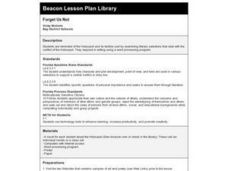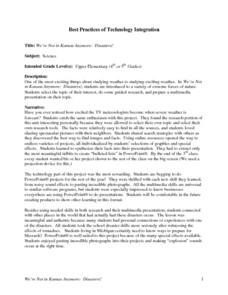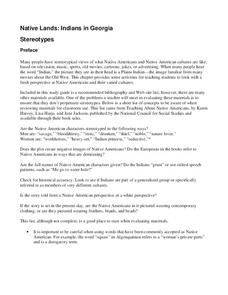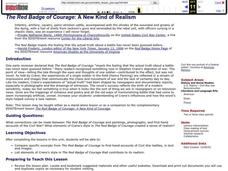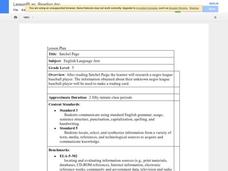Curated OER
Sanitarium Times
Students learn about the Sanitarium Times as they look into how they lived, what they ate, how they were entertained, etc... In this Sanitarium Times activity, the students do research and create papers as well as look for living members...
Curated OER
Find the Odd One Out
In this same or different worksheet, students look at four objects and determine which one does not belong. They click on the object that is different than the others.
Curated OER
Click!
Learners think about what it was like when audiences flocked to movies that simply showed glimpses of everyday life. They make a film n the style of the earliest cinema, when moving pictures were just that -- moving images of everyday life.
Curated OER
Mission Planning: Earth/Mars Comparisons
Learners compare and contrast conditions on Mars to those on our own planet, specifically, their local or regional environments. The physical characteristics, the atmosphere, and other astronomical data is considered.
Curated OER
Couch Potato or Inertia Victim?
Sixth graders how primary research is carried out. They design a simple survey questionnaire to interview people about their week average television watching time. They analyze the results and write a report based on the information.
Curated OER
The Bozeman Trail
Eighth graders are introduced to the Bozeman Trail. Using the internet, they research the trail to discover the forts located on its path. They must also locate and label landmarks on a map using symbols they create. They answer...
Curated OER
Think Green
Students experience and practice compositing and recycling through hands-on-activities. They distinguish between which items from their trash can be recycled, composted and reused. The process for making recycled paper is also covered in...
Curated OER
How to Recycle a Rock
Third graders explore the rock cycle and explore how rocks are made, changed, destroyed and recreated. They create representations of these processes with hands-on activities.
Curated OER
Forget Us Not
Young scholars read a literary selection about the Holocaust. They examine a website with art and poems created by students regarding this topic. Then they create poetry that demonstrates their understanding of the literary selection on...
Curated OER
We're Not in Kansas Anymore: Disasters!
Students explore weather. They discuss a variety of extreme forces of nature. Students select a topic of their interest and research that topic. They prepare a multimedia presentation on their selected weather topic. Students present...
Curated OER
New Breed of Robots Takes War To the Next Level
Students study an article and answer questions. In this exploring robots lesson students read an article on military robots and answer questions.
Curated OER
How Do We Forecast Weather?
Third graders investigate how scientists collect weather data in order to forecast the weather. They work in small groups in order to research one type of weather technology such as, satellite images, radar, surface observations, or...
Curated OER
Concise Writing Exercises
Are your pupils' essays full of long, wordy sentences? Help them to write more concise sentences with this practice worksheet, which provides twenty long sentences for your young editors to proofread. Use the activity as a homework...
Curated OER
Native Lands: Indians in Georgia
Students research what Native Americans looked like in order to dispel common stereotypes. In this Native American history instructional activity, students begin by drawing their mental picture of an Indian, then they research...
Curated OER
What Are We Looking At?
Students investigate different perspectives through a farming simulation. In this photo perspectives lesson plan, students examine different photographs taken by satellite or from ground level. Students then discuss the differences and...
Curated OER
Folk Music
Students explore Folk Music in Iowa. For this folk music lesson, students discuss different types of folk music and how it relates to life in Iowa. They take the tune of a song and write their own lyrics to describe their life.
Curated OER
The Red Badge of Courage: A New Kind of Realism
Is it possible to tell a true war story? Tim O’Brien says that fiction is for “getting at the truth when the truth isn’t sufficient for the truth.” To get at the truth about war, class members examine primary source materials from the...
Curated OER
Different Points of View
Considering an examination of point of view? Use visual arts to engage learners in of this element of art and literature. Class members select a portrait from the Renaissance Connection and, guided by a series of brainstorming...
Time Warp Trio
See You Later, Gladiator!
Young historians take a look at the age of gladiators, and the cultural atmosphere present when they staged their epic battles. Pupils pretend to be reporters and write newspaper articles about one of the events they stage. Then,...
Curated OER
General Music: Star Spangled Banner
"The Star Spangled Banner" became our country's national anthem, but why? Second and third grade musicians read about the song, analyze the lyrics, and discuss patriotism. They then complete a related word search.
Curated OER
Shapes, Patterns, and Plants
Young scholars imagine they are animals in the Palace Facade painting. In this Palace Facade lesson plan, students observe and discuss the geometric and organic shapes in the painting shown to them.
Curated OER
Satchel Page
Bring a lesson about Negro League Baseball to your Black history unit, or any other research unit throughout the year. While the lesson plan itself is simplistic, there are several good ideas that you could use, such as creating trading...
Curated OER
Volume of a Cylinder
Students predict the shape of a geometric figure in 3D. In this geometry lesson, students construct 3D shapes to perfect their knowledge of measuring and predicting. This assignment is also available as an online interactive...
Curated OER
Cause and effect Relationship
Students examine folk’s tales for Cause and Effect. For this literature lesson, students read "The Origin of Fire" and "The Origin of Medicine” and look for cause and effect. They use a TI Navigator to write down their findings.










